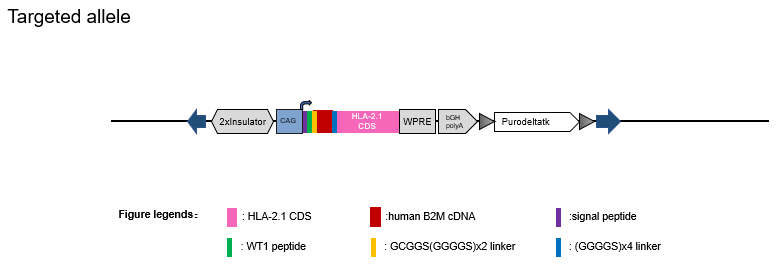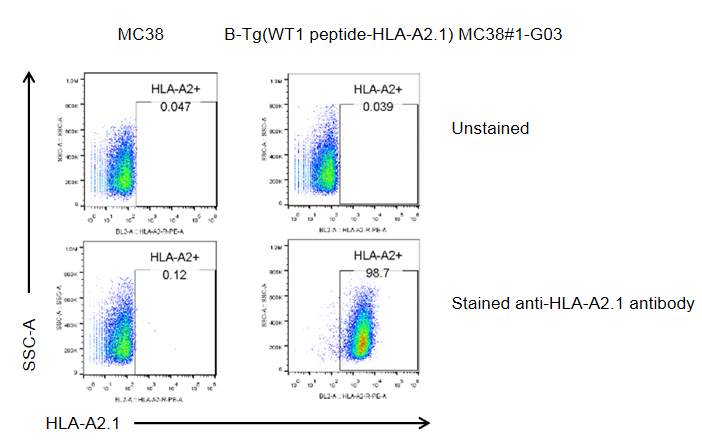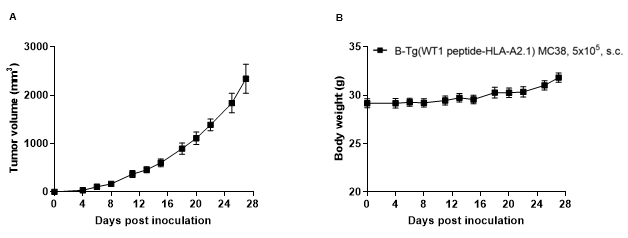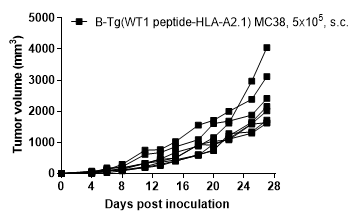


• 322369

| Product name | B-Tg(WT1 peptide-HLA-A2.1) MC38 |
|---|---|
| Catalog number | 322369 |
| Strain background | C57BL/6 |
| Aliases | HLA |
| Tissue | Colon |
| Disease | Colon carcinoma |
| Species | Mouse |
| Application | B-Tg(WT1 peptide-HLA-A2.1) MC38 |
on this page
The coding sequence of human B2M gene and the whole genomic sequence of human HLA-A2.1 gene were randomly inserted into the genome of B-Tg(WT1 peptide-HLA-A2.1) MC38. Human HLA-A2.1 is highly expressed on the surface of B-Tg(WT1 peptide-HLA-A2.1) MC38.

Gene targeting strategy for B-Tg(WT1 peptide-HLA-A2.1) MC38. The coding sequence of human B2M gene and the whole genomic sequence of human HLA-A2.1 gene were randomly inserted into the genome of B-Tg(WT1 peptide-HLA-A2.1) MC38. Human HLA-A2.1 is highly expressed on the surface of B-Tg(WT1 peptide-HLA-A2.1) MC38.

HLA-A2.1 expression analysis in B-Tg(WT1 peptide-HLA-A2.1) MC38 by flow cytometry. Single cell suspensions from wild-type MC38 and B-Tg(WT1 peptide-HLA-A2.1) MC38 cultures were stained with species-specific anti-HLA-A2.1 antibody. Human HLA-A2.1 was detected on the surface of B-Tg(WT1 peptide-HLA-A2.1) MC38 cells but not wild-type MC38 cells. The 1-G03 clone of B-Tg(WT1 peptide-HLA-A2.1) MC38 cells was used for in vivo experiments.

Subcutaneous homograft tumor growth of B-Tg(WT1 peptide-HLA-A2.1) MC38 cells. B-Tg(WT1 peptide-HLA-A2.1) MC38 cells (5x105) were subcutaneously implanted into B-HLA-A2.1 mice (female, 7-week-old, n=8). Tumor volume and body weight were measured three times a week. (A) Average tumor volume ± SEM. (B) Body weight (Mean ± SEM). Volume was expressed in mm3 using the formula: V=0.5 X long diameter X short diameter2. As shown in panel A, B-Tg(WT1 peptide-HLA-A2.1) MC38 cells were able to establish tumors in vivo and can be used for efficacy studies.

B-Tg(WT1 peptide-HLA-A2.1) MC38 tumor cells growth of individual mice. B-Tg(WT1 peptide-HLA-A2.1) MC38 (5x105) were subcutaneously implanted into B-HLA-A2.1 mice (female, 7-week-old, n=8). As shown in panel, B-Tg(WT1 peptide-HLA-A2.1) MC38 cells were able to establish tumors in vivo and can be used for efficacy studies.